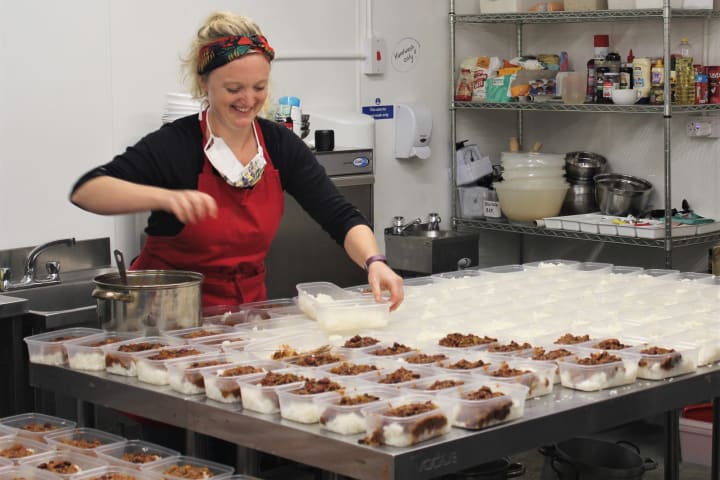Where help and hope are on the menu
How a cafe in northern England is using unwanted food to support hundreds of vulnerable households

Not every café is the same. On Chester-le-Street High Street, REfUSE has established itself as a hub in this County Durham market town. The café has a special ethos – combating food waste by rescuing ingredients rejected by retail and creating a vibrant community space in the town centre. That usually makes it a bustling hub, with live music and open mic nights adding to a winning recipe, and all on a ‘pay-as-you-feel’ basis.
At the same time, REfUSE was home to a diverse community of volunteers. Manager Nikki Dravers said: “Those volunteers are the hub of our community, if you talk about a social benefit, that all comes from them. They all come from such diverse walks of life. We have women who are widowed and young people with learning disabilities, we have people coming through addictions. It’s such a melting pot of people who wouldn’t normally mix, but here they’ve found a real community, a kind of family.”

Coronavirus, and the abrupt closure of Britain’s towns, changed all that. Overnight, the café had to transform itself – all while confronting the immediate loss of all its income.
“We basically completely changed our model from a social enterprise and business to being a charity, all paid for by grants and fundraising” Nikki added. “We’ve had grants through the County Durham Community Foundation, via the National Emergencies Trust, and we got some from the council as well. Then we have a crowdfunder going with our partners at Handcrafted .”
That fundraiser has brought in over £20,000 in less than three months, averting a financial crisis.
“We really panicked at the start because everything was shutting down. Summertime is busy for us, we do a lot of event catering to raise funds for the café. We just saw all these emails coming in, cancelling, in that first week and with the café closed as well, we didn’t know where the money would come from.”
‘The system is broken’
The new normal keeps Nikki and her team busy in the warehouse behind the former furniture store that is REfUSE’s home. The storage space is a boon, especially as the current crisis highlights the flaws in our food supply chains.
“It’s ridiculous. Recently we’ve had two or three huge amounts of food from Amazon because they simply can’t store it themselves,” Nikki explained. “Their head office anticipated a high demand for food, so they’ve shipped massive van loads to their hub in Tees Valley. It gets there, and the guy on the site has no more fridge space. It literally just arrives at Amazon and goes straight into our van. We’re getting chicken, yoghurts that are dated end of August, beginning of September. It’s crazy.

“And good food can be rejected for all sorts of things – barcodes printed wrong, damaged packaging for one item, so the whole palette gets thrown away. In May we collected over 10 tonnes of food and in the first eight days of June we’ve collected three-and-a-half tonnes already.
“The system is broken. When everyone was going mad in the supermarkets and there was no flour, no pasta, no loo roll – we were getting all that! It’s a massive structural failure. How can it make economic sense for these businesses? Think of the value of the stuff we’re getting, probably about a tonne and a half a week from Amazon alone.”
Under the new set-up, REfUSE finds itself at the sharp end of another struggling system – support for the most vulnerable in society. Along with Handcrafted, a support work charity that shares the building, the café has been preparing and distributing meals and food parcels to an ever-growing number of people in the local area.

“Lots of the people who usually come to Handcrafted’s workshops were used to coming in and getting a meal while they were here,” Nikki explained. “Often it was the only meal they would get all day. After lockdown all that stopped, so Handcrafted started cooking meals and making up boxes that they deliver every day. They did 40 in the first week, now we’re working together to do 200 a day.”
It’s not just food, of course. Deliveries give a chance to check in with people who might be struggling with addictions, at risk in potentially abusive relationships, financial hardship or mental health problems. A few minutes’ chat can make a huge difference to the individuals caught up in a surge of mental health concerns.
“Demand has gone through the roof,” Nikki added. “Handcrafted just get referral after referral from care leaders, mental health support teams, social workers and so on. We supply them with food and we’ve just started doing some of the cooking, contracted by them, to free up more time for their support work.”

In addition, REfUSE is preparing about 185 food boxes a week to provide a supply of groceries to households facing difficulties. Again, demand keeps increasing as the pandemic continues. “Many of these people contacted us directly; they heard what we are doing and came to us and said they were struggling because of something. Or they are referrals from other organisations, a lot are sent by social workers, doctors, mental health workers. A lot of people are struggling at the moment.
“I think the worst is yet to come. There’s going to be such an aftermath of mental health problems. It’s just so hard for people who are alone, especially if they are alone with kids. We have one single parent looking after eight children and another one with five. In one of those families there are severe health problems so they all have to shield. How do you even start to think about coping with that?
“Some people are really struggling and it’s massive privilege to be able to do something to help, even if it’s just delivering food.”
What happens next?
A week after I met with Nikki, Britain began its much-heralded emergence from lockdown. The reopening of ‘non-essential’ shops brought crowds to some towns. But, for cafés, bars and restaurants, the future remains uncertain. REfUSE’s current funding is good until July 8 – Whitehall whispers hint at a desire for cafes and bars to reopen on July 4, at least in some form – but the nature of a ‘socially-distanced’ café remains unclear.
“Our heart, the reason we exist, is for the community,” Nikki explained. “It’s about social interaction, bringing people together who wouldn’t normally mix. It just feels very difficult to imagine what this café would look like with strict social distancing in place.

“The way we offer a pay-as-you-feel menu, that drop in, give what you can ethos is so important to us. And, because of the way we source our ingredients, we can’t offer a regular daily menu for delivery or collection, that’s almost impossible. Plus our kitchen is really small so it’s hard to keep the volunteers at a distance.
“It feels like a bit of an insurmountable challenge right now, but we’ll get there. We’re really innovative and our volunteers are really keen to get back. We’ll definitely have takeaway coffee and cake quite soon and we’ll be doing meals again at some point after that.”
In addition, for an organisation rooted in the need to support and sustain communities, there are hopes that the pandemic might start to encourage people to shop local.
“If you look at the High Street here in Chester-le-Street, it has pretty much everything you need in one mile. It’s very doable here, buying local and supporting local. I think people are starting to look more locally for their everyday needs. I haven’t seen stats but I’ve seen a lot of things online in the Chester-le-Street forums where people are saying how they can’t wait to get back and support local shops.”
REfUSE was quick to set up an open source list of places providing food in the north-east of England, and that quickly evolved into a list that championed local producers. Many businesses were able to introduce delivery services – perhaps because the shop had to close, or because they could get help from people furloughed from their regular jobs.
“That’s also empowering local producers,” Nikki added. “The beef we’re using today comes from a farm where we deliver some of the food waste that we can’t use. Their pigs eat it, which is great! So there’s this amazing farm producing amazing meat and it lost all the custom because nobody could sell it to the butchers anymore.
“One of our staff team at REfUSE, Michelle, set up a Facebook page for the famer and within a few days her demand went through the roof. Now she’s doing really well. Hopefully that will set her up and we’ll continue to see people buying directly from the farm.”
This article is part of the Talking Northeast project, now running on Substack. Please take the time to explore the blog and consider subscribing if you like our work. If a subscription is not right for you at present, please consider making a one-off donation via Talking Northeast’s ‘Buy Me a Coffee’ page.

About the Creator
Andy Potts
Community focused sports fan from Northeast England. Tends to root for the little guy. Look out for Talking Northeast, my new project coming soon.







Comments (1)
Thanks for resharing this Andy. these organisation are really helpful to those in need